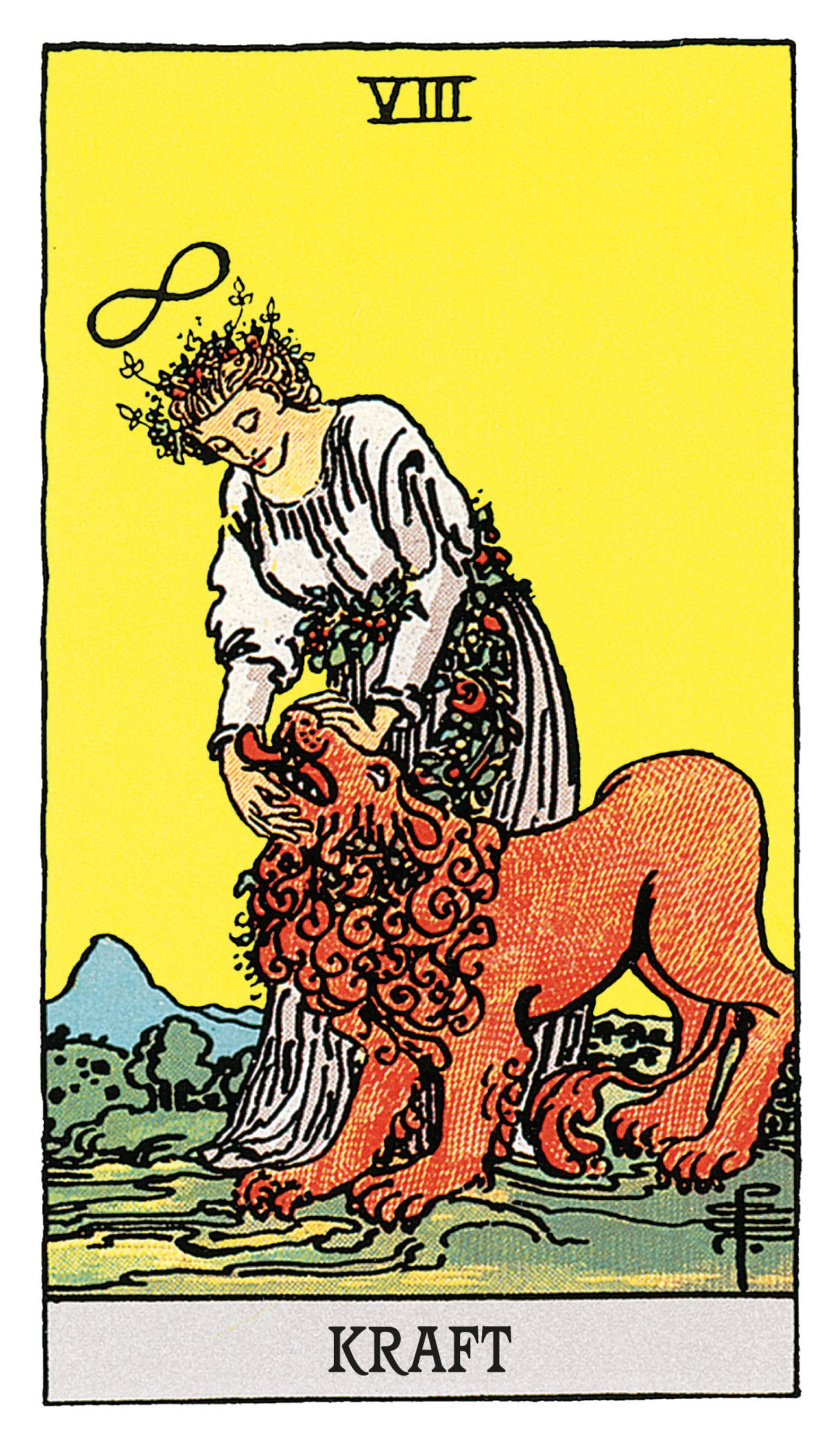
Hawkins / Macht
Inhaltsverzeichnis: (verbergen)
|
In dem Wörtern Macht, Mama, Magd und Mädchen ist die erste und wichtigste Silbe Ma = Mutter (Mater / Materie) enthalten, die ein Säugling zu lallen lernt.
Macht hat den Bedeutungsgehalt von VERMÖGEN, POTENZ (siehe lateinisches Nomen potencia), KÖNNEN, Kompetenz, Wirkmacht.
Interessante Wortverwandtschaften
 Tarotkarte 8 – KRAFT Hinter einer Handlung gibt es keinen Tuenden, sagt Hawkins, denn die Dinge geschehen aus sich heraus, wenn ein Feld fruchtbar ist.
Ein inspirierter Mensch ist be-geistert vom Geist des Göttlichen erfasst. Das Wort "Enthusiasmus" setzt sich aus den beiden griechischen Wörtern "en" und "theos" zusammen und heißt übersetzt: 'eins mit göttlichen Energie sein'. Das Wort Inspiration kommt vom lateinischen "spirare", das 'Geist, atmen, Leben geben' bedeutet. Weitere Definitionen sind: 'Einatmen; Beleben; Stimulation durch eine Gottheit, ein Genie, eine Idee oder eine Leidenschaft; ein göttlicher Einfluss auf Menschen'.
Wirkmacht//Schöpfungskraft erhält sich selbst, indem sie stetig immer mehr Energie aus dem Göttlichen empfängt; sie ist die Folgeerscheinung der Ausrich-
Göttliche Macht wirkt spontan, genau zeitlich abgestimmt und aus einer höher schwingenden, allumfassenden Wissendheit heraus. Die Entfaltung der Wirk-
Göttliche Macht findet Anklang bei dem, was erhebt, würdigt und veredelt. Sie beruht auf Wahrheit und eint.
Wirkmacht zeigt sich als "natürliche Autorität". Träger der Wirkmacht werden von Inspirierten um Rat gebeten. Sie wird Menschen zuerkannt, die auf Grund ihres Wissens, ihrer Wissendheit, ihrer Erfahrung und ihrer Fürsorglichkeit Vertrauen erwecken.
Wird Macht "genommen" (erzwungen), geschieht der Missbrauch von Macht ohne Rücksicht und Bedenken auf etwaige Schäden, die daraus resultieren.
⚑ Zwang / Dominationsmacht — orientiert an Inhalten
|
| Siehe auch: ► Wirkmacht (Kraft) ⇔ Dominationsmacht (Zwang) und ► Zwangsmacht ⇔ Wirkmacht |
Bekenntnis
Öffentlicher Appell
Einsichten

Beachte: Das Wort Macht wird oft verwendet um Zwangsthemen zu beschreiben.
|
Personal avowals
Recommendations
Appeal
Conclusions
|
Dacher Keltner, Ph.D. (*1962) US American professor of psychology, University of California, Berkeley, altruism researcher, direc- tor of the Greater Good Science Center, author, The Power Paradox. How We Gain and Lose Influence, Penguin Books, United Kingdom, 17. May 2016, reprint paperback edition 16. May 2017
|
|

|
Literary quotes
Movie lines
|
| |||||||||||||||
Links zum Thema Wirkmacht (Kraft) / PowerLiteratur
Literature (engl.)
The Power Paradox Quotes, presented by the US American "social cataloging" website Goodreads, ~2017
Externe Weblinks
External web links (engl.)Audio- und VideolinksAudio and video links (engl.)
Understanding the difference between predatory and non-predatory power: commitment/clear intention, motivating crescendo, immediate
|
Wiki-Ebene
Englisch Wiki
1 Zwang ist die energieraubende Nutzung von Macht im Sinne von Max Weber: Jede Gelegenheit ergreifen, in einer sozialen Beziehung den eigenen Willen auch gegen Widerstand durchzusetzen. ⇑
2 Sedona Seminar Thought and Ideation, 3 DVD set, 28. February 2004 ⇑
3 CD series The Highest Level of Enlightenment, CD 3 of 6, Nightingale-Conant, January 2003 ⇑